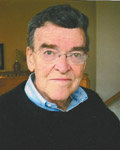December 5, 2011
Max’s Musings
 By Max Molleston
By Max Molleston
The art of poetry seems to be divided, in fact, and in fancy with line endings and the spacing of the resulting verse. But there is also a ferocity involved. First, there is a ferocious knowledge of language and its usages. A dictionary refers to ferocious as wild, the way we usually understands the word and its settings. The word can also be dealt with as great, like a ferocious appetite. Sometimes it is wild and sometimes great, the work that applies to the writing of poetry. In modern times, rhyme continues to carry a standard for understanding this type of writing. To me and others who spend time with poetry, rhyme means words at the end of lines of poetry use matching sounds to carry the poem forward. We’ll work with rhyme used in a poem of Robert Frost. I like the sense of it, and the way it builds in the brain and ears of reader or listener. I’ve used it before in these columns on poetry.
Neither Out Far Or In Deep
The people along the sand
All turn and look one way.
They turn their back on the land,
They look at the sea all day.
As long as it takes to pass
A ship keeps raising its hull;
The wetter ground like glass,
Reflects a standing gull.
The land may vary more
But whatever the truth may be —
The water comes ashore,
And the people look at the sea.
They cannot look out far,
They cannot look in deep,
But when was that ever a bar
To any watch they keep?
Those of us keen to rhyme can see and can hear its effect in a rather simple and understandable manner. A noted poet, Oliver Wendell Holmes, son of a poet, trained to the law and was selected for duty on the U.S. Supreme Court. Holmes, born in 1841, saw The Complete Poetical Works of Oliver Wendell Holmes first copyright in 1872. Holmes rhyme pattern comes on the two initial stanzas here.
On The Death of President Garfield
Fallen with autumn’s falling leaf
Ere yet his summer’s noon was past,
Our friend, our guide, our trusted chief, —
What words can match a woe so vast!
And whose the chartered claim to speak
The sacred grief where all have part,
Where sorrows saddens every cheek
And broods in every aching heart?
Justice Holmes was Harvard schooled. We can see and feel the classic style of his rhyming. The poem rolls on another 68 lines, explaining and lamenting, and maintains strength it set out to hold, although it seems to involve quite a little huffing and puffing elevating the language. The classic rhyme scheme is second nature to many poetry readers, and was to millions now dead who were exposed to the rhyming of Justice Holmes and countless others who “versed out” events and feelings. Frost is full of ego, yet plain spoken in his poetry and prose: Death of a Hired Man, his prose poem stays with readers who dig in and reflect on it. All we’ve worked with this month is part and parcel of American poetry, which was changed immutably by Walt Whitman, whose style I have described as a rhyming in “loops” which seem to tighten around the theme he is building at any given stage in his Song of Myself work.
Early next year will begin my eighth year bringing these poems and thoughts to you. I enjoy and hope you do, too.
Filed Under: Personal Growth
Tags: Autumn Leaf, Complete Poetical Works, Dictionary, Ears, Falling Leaf, Ferocious Appetite, Ferocity, Garfield, Knowledge Of Language, Listener, Musings, Oliver Wendell Holmes, Poem Of Robert Frost, Poet, President Garfield, Rhyme Pattern, Robert Frost, Stanzas, Understandable Manner, Woe
Trackback URL: https://www.50pluslife.com/2011/12/05/max%e2%80%99s-musings-28/trackback/


